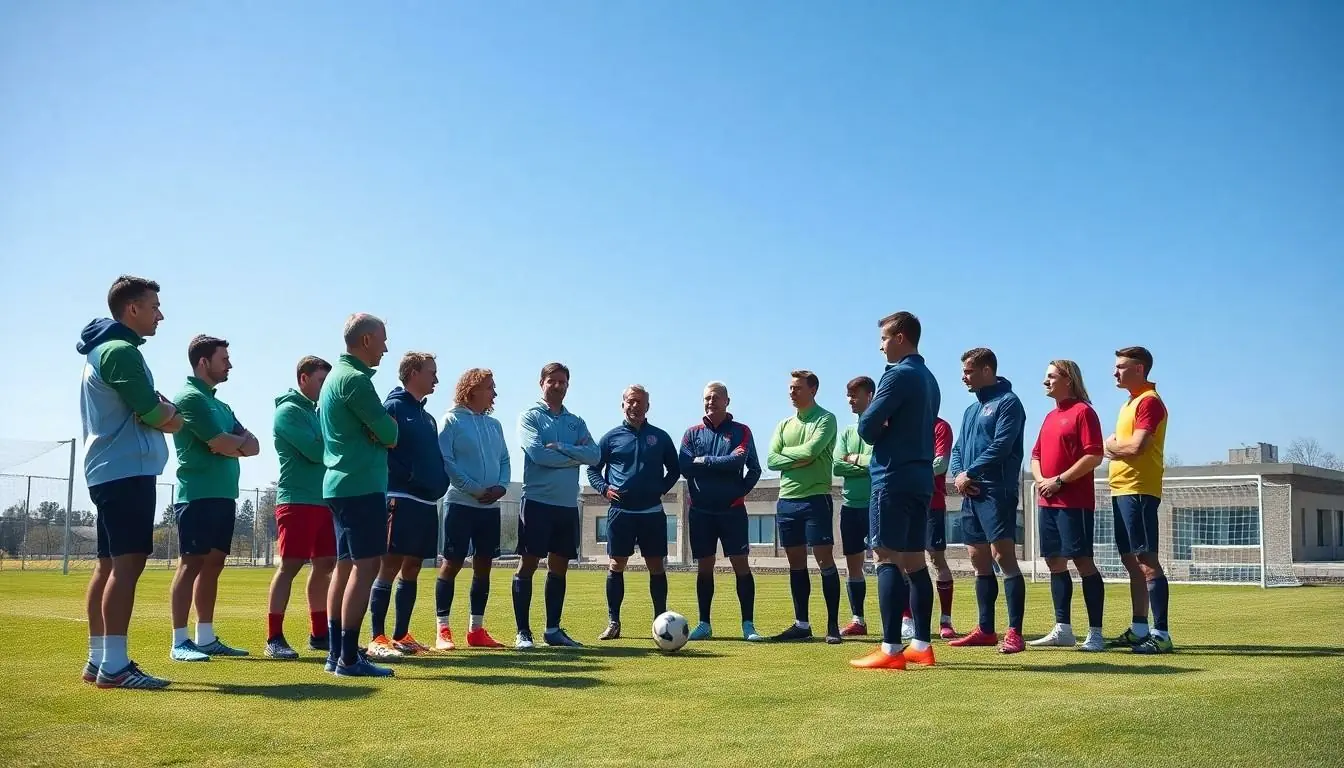Ever dreamt of strutting along the touchline, clipboard in hand, while the crowd roars your name? Becoming a football manager isn’t just about wearing a snazzy tracksuit; it’s about leading a team to glory and occasionally yelling at the referee. It’s a wild ride filled with strategy, passion, and the occasional post-match pizza party.
Table of Contents
ToggleUnderstanding the Role of a Football Manager
The role of a football manager involves strategic oversight and team leadership. Managers not only guide players but shape the club’s identity as well.
Key Responsibilities
Developing a game plan ranks as a primary responsibility. Managers analyze opponent tactics while adapting their strategies to ensure competitive advantage. Leading training sessions proves crucial for maintaining team performance and fitness levels. Managers foster team cohesion by building strong relationships with players, staff, and club officials. Decision-making during matches impacts immediate outcomes, with managers making substitutions or tactical adjustments based on game dynamics. Furthermore, handling media interactions allows managers to communicate club philosophies and mitigate external pressures.
Skills Required
Leadership abilities stand out as essential for a football manager. They must inspire and motivate players to achieve their best performance. Strong communication skills facilitate clear directions, fostering trust and respect among team members. Tactical knowledge remains vital; managers analyze formations and positional play to enhance match effectiveness. Additionally, managers need to possess problem-solving capabilities to address challenges that arise during training or matches. Emotional intelligence aids in understanding player needs, enhancing interpersonal connections. Flexibility allows managers to adapt to ever-evolving game scenarios, making them resilient leaders in high-pressure environments.
Pathways to Becoming a Football Manager
Aspiring football managers can explore several pathways to enter the profession. Formal education and coaching certifications play crucial roles in preparation.
Formal Education Options
Many football managers benefit from formal education in sports management, physical education, or a related field. Universities offer degrees that cover essential topics like leadership, sports psychology, and business administration. Graduating from a reputable institution can enhance understanding of team dynamics and improve decision-making skills. Additionally, some programs provide practical experiences, such as internships with professional clubs, connecting students with industry professionals.
Coaching Certifications
Obtaining coaching certifications is vital for aspiring managers. Organizations like UEFA or national football federations offer various coaching courses. Starting with an introductory level, individuals can progress to more advanced qualifications, focusing on tactical strategies and player development. Completing these certifications demonstrates commitment and enhances credibility in the football community. Furthermore, participating in continuous education ensures managers remain updated on evolving tactics and training methods.
Gaining Experience in Football Management
Aspiring football managers can enhance their skills and knowledge through hands-on experience in the sport. Gaining practical knowledge and understanding of team dynamics is vital for success.
Volunteer and Entry-Level Opportunities
Volunteering at local clubs or schools provides essential insights into football management. Many individuals start as assistants to coaches, allowing them to learn about training methods and game strategies. Entry-level positions often serve as stepping stones, offering invaluable experience in player management and team organization. Assisting with match day operations can also expose newcomers to the tactical aspects of the game. Engaging in these opportunities helps build a foundation for a successful managerial career.
Networking in the Football Community
Establishing connections within the football community is crucial for emerging managers. Attending coaching clinics and workshops offers chances to meet experienced professionals. Building relationships with other coaches and sports directors can lead to mentorship opportunities, guiding new managers in their progression. Joining local, regional, or national football associations opens doors to valuable resources and job prospects. Ultimately, a strong network can significantly enhance a manager’s visibility and credibility in the competitive football landscape.
Strategies for Advancement
Aspiring football managers can utilize various strategies for career advancement, maximizing their potential in the competitive field of football management.
Building a Personal Brand
Creating a personal brand increases visibility and recognition within the football community. Managers should document their coaching philosophies and achievements through social media platforms and professional websites. Engaging content, including analysis of recent matches or tactical insights, positions them as knowledgeable figures. Consistency in sharing relevant information builds trust among peers and fans. Networking with influencers and collaborating on projects strengthens professional connections. Highlighting unique coaching experiences can differentiate an aspiring manager from others. A well-crafted brand can lead to opportunities for interviews, guest coaching, or mentorship.
Leveraging Success in Lower Divisions
Success in lower divisions serves as a stepping stone to higher managerial roles. Managers should aim to achieve measurable results, such as promotions or cup victories. Developing players and implementing effective strategies demonstrates their capabilities. Observing and analyzing opponent tactics offers valuable insights that improve future performances. Building a solid reputation in these leagues can attract attention from clubs at higher levels. Engaging in community initiatives enhances a manager’s image and fosters local support. Sharing success stories showcases their qualifications and highlights potential for advancement.
Conclusion
Becoming a football manager is a challenging yet rewarding journey. It requires a blend of strategic thinking leadership and continuous learning. Aspiring managers must embrace the importance of education hands-on experience and networking within the football community.
By developing a personal brand and showcasing their achievements they can increase their visibility and credibility. Success in lower divisions can serve as a launchpad for higher managerial roles. With dedication and the right approach anyone can carve out a successful career in football management.





